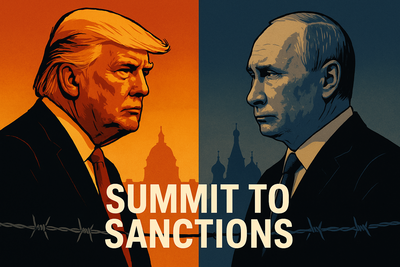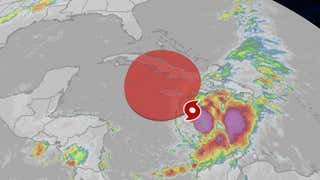
In the span of a week, US President Donald Trump went from planning a summit with President Vladimir Putin in Budapest to placing the harshest sanctions yet on Russia’s economy. The about-face was not just sudden-it was personal.TL;DR: Driving the news
- On October 22, the US treasury department sanctioned Rosneft and Lukoil—Russia’s two largest oil companies—and 34 of their subsidiaries.
- The move marked the first major economic strike by the Trump administration against Moscow during his second term, and it targets what one senior US official called “the ATM of the Russian war machine.”
- The sanctions target more than 34 subsidiaries and aim to freeze Russia’s main cash pipeline fueling its war in Ukraine.
- The sanctions didn’t just freeze assets or bar US firms from doing business. In a critical twist, the US warned that any bank, anywhere, facilitating purchases of oil from these firms could be cut off from America’s financial system. That secondary threat had immediate global impact.
- The announcement sent global oil prices soaring by 5% and sent shockwaves through markets in China and India, the two largest buyers of Russian crude.
- Chinese state-owned refiners suspended purchases. Indian refiners, including Reliance Industries, began adjusting or slashing imports.
- “We waited a long time,” Trump told reporters at the White House. “It didn’t feel like we were going to get to the place we have to get.”
- Still, the central question remains: will this actually move Putin?
‘Don’t Poke The Bear’: Putin FIRES At Trump’s Sanctions, EU Toilet Ban; Shoots Russian Oil Warning
Why it matters
- Trump’s sanctions strike at the very heart of the Kremlin’s wartime economy. Together,
Rosneft and Lukoil produce 5 million barrels of oil a day, half of Russia’s total output, and account for over 2 million barrels in exports. - “It’s the most material move to date by the United States to shutter the Russian war ATM,” Helima Croft, of RBC Capital Markets, told CNN.
- The US Treasury said the new sanctions are designed “to degrade the Kremlin’s ability to raise revenue for its war machine and support its weakened economy.”
- And while Russia has often found creative ways around sanctions, the pressure is mounting. According to Reuters, several Chinese and Indian refiners paused purchases of Russian oil within hours of the announcement.
The big pictureThe escalation follows months of Trump’s failed efforts to charm, cajole, and pressure Putin into negotiations.He offered incentives: a future summit, the prospect of post-war economic deals, and long talks with Putin. But according to WSJ, Trump’s patience snapped after yet another Russian missile strike on a Ukrainian kindergarten just days before the summit was to be held.“Every time I speak with Vladimir, I have good conversations and then they don’t go anywhere,” Trump said.As per the WSJ, the White House had long prepared three sanction packages-mild, moderate, and severe. Trump ultimately chose the “middle” option: hammer the oil industry but stop short of full economic warfare.Insiders say the final decision came after an Oval Office meeting with Secretary of State Marco Rubio, Defense Secretary Pete Hegseth, and Treasury Secretary Scott Bessent.“Do you guys agree with me?” Trump asked before signing off.What they’re saying
- Putin, appearing unmoved, called the sanctions “an unfriendly act” and insisted they would not inflict “significant” damage to Russia’s economy.
- “No self-respecting country and no self-respecting people ever make decisions under pressure,” Putin told reporters in Moscow.
- Trump responded later that day with a smirk:
- “I’m glad he feels that way. That’s good. I’ll let you know in six months.”
- Ukraine’s President Volodymyr Zelenskyy praised the move but urged more.
- “Sanctions are very important,” Zelenskyy said during a tense lunch with Trump. “But they are not yet enough.”
- Meanwhile, Indian energy giant Reliance Industries said it would “adjust purchases” in light of the sanctions. India imports up to 2 million barrels a day from Russia-over 40% of Russia’s seaborne exports.
- Still, as the Economist and CNN note, many Indian and Chinese refiners use third-party intermediaries to avoid direct exposure to US enforcement. That gives them cover-unless Trump decides to enforce secondary sanctions.
- “Getting Putin to commit to serious concessions will take a lot more than sanctions,” Kurt Volker, Trump’s former Ukraine envoy, told WSJ. “Sending long-range missiles would be an important next step.”
Zoom inTrump’s move represents a break from his previous reluctance to touch Russia’s oil exports-something even the Biden administration avoided to keep gas prices stable.But Trump’s calculus has changed:
- Global oil prices are down 25% since January, giving him room to maneuver without triggering a domestic backlash.
- New sanctions by the UK and EU-including bans on Russian LNG imports-have created a rare moment of alignment.
- The Kremlin’s energy revenues have already dropped 21% this year due to drone strikes on refineries and falling global demand.
- Still, enforcement remains the wild card. As CNN noted, Russia has built an “off-grid infrastructure” of shadow tankers, cutouts, and obscure banks to keep oil flowing.
“The lasting impact depends on the US appetite to tackle those workarounds,” Richard Bronze of Energy Aspects told CNN.So far, the ruble has held steady, and Russian oil has not disappeared from world markets. But the friction is growing, and the logistical costs for Moscow are rising.Between the lines
- Trump’s strategy seems torn between pressure and persuasion.
- He still wants a deal. He hasn’t ruled out another meeting with Putin. But the shift in tone is unmistakable-from “art of the deal” to “enough is enough.”
- A senior administration official told WSJ: “It was the culmination of good calls [with Putin] and then reading the papers and seeing Russia is still bombing schools.”
- Despite Trump’s reputation for chaos, European leaders have cautiously welcomed the sanctions. Nato Secretary General Mark Rutte made a surprise visit to the White House just before the announcement, urging continued US support for Ukraine.
- Even Trump’s usual Republican skeptics fell in line:
- Sen Marco Rubio, once a critic, said, “This was overdue.”
- Sen John Thune called for a sanctions bill “to back the president’s efforts to bring the bloodshed to an end.”
What’s nextSanctions alone won’t bring peace. But they signal the end of the summit era and the start of a harder phase in Trump’s Ukraine strategy.If Russia’s oil exports start to fall significantly, pressure on the Kremlin will mount. But that outcome depends largely on whether:1. India cuts deeper – PM Modi may demand concessions in return.2. China stays cautious – Beijing opposes unilateral sanctions but paused some purchases.3. Trump enforces penalties – Will he go after buyers and shippers who defy the rules?Experts agree the effect will be limited unless secondary sanctions follow.“Russia has set up a total off-grid infrastructure to be able to keep on supplying its oil to its trading partners, especially in India, especially in China,” Ajay Parmar, director of ICIS, told CNN.On the battlefield, the US has still withheld long-range missiles. But Trump hinted he’s reconsidering. If Russia escalates in response, he may reach for that option too.The bottom lineTrump is trying to turn economic pain into political leverage. The question is whether Putin blinks-or doubles down.This could be the start of a tougher era in US-Russia relations-or just another pivot in Trump’s unpredictable diplomacy.As Janis Kluge of the German Institute for International and Security Affairs told CNN: “Yes, it could be different tomorrow again. But it’s a signal that the mode of dealing with Russia-always giving another chance-has ended.”(With inputs from agencies)






